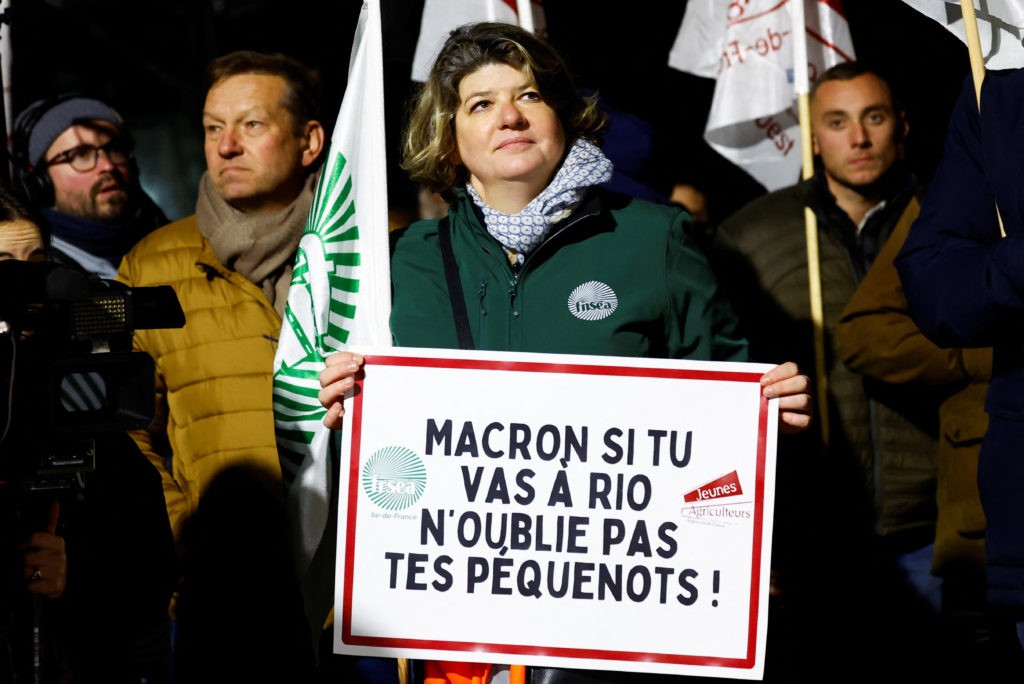French farmers have mobilized in significant protests across the country, drawing attention to their grievances against the EU-Mercosur trade agreement. These demonstrations, gaining momentum and public support, are rooted in deep-seated concerns about fair competition, environmental standards, and the future of French agriculture. This article delves into the core reasons behind the widespread protests by French farmers, exploring the complexities of the EU-Mercosur deal and its potential impact.
The heart of the issue lies in the EU-Mercosur trade agreement, a deal initially struck in 2019 between the European Union and the Mercosur bloc – comprising Brazil, Argentina, Paraguay, Uruguay, and Bolivia. While proponents tout its potential to boost economic ties by eliminating tariffs on European exports like machinery and cars, French farmers view it as a direct threat to their livelihoods. Negotiations have been ongoing and fraught with contention, particularly due to resistance from farmers and governments like France.
 A farmer holds a sign protesting the EU-Mercosur trade deal, emphasizing concerns for local agriculture and national identity.
A farmer holds a sign protesting the EU-Mercosur trade deal, emphasizing concerns for local agriculture and national identity.
The primary concern for French farmers centers on unfair competition. The EU-Mercosur agreement proposes to eliminate duties on imports from Mercosur countries, including key agricultural products like beef, poultry, and sugar. French farmers argue that South American producers operate under significantly less stringent environmental and production standards. This disparity, they contend, creates an uneven playing field where they cannot compete. They fear being undercut by cheaper imports produced at lower costs due to less rigorous regulations on pesticides, animal welfare, and environmental protection.
French Foreign Minister Jean-Noël Barrot has echoed these concerns, stating the agreement is “unacceptable as it stands.” The fear is that the deal could be finalized imminently, potentially even at the G20 summit, leaving France with limited power to veto or significantly alter the terms. While some EU nations like Germany and Spain see the Mercosur deal as beneficial for broader economic and geopolitical reasons, France remains wary of the potential damage to its agricultural sector.
Spanish Farm Minister Luis Planas Puchades highlights the broader perspective, questioning if the EU should isolate itself economically or expand trade networks, especially given the current global geopolitical landscape. This viewpoint underscores the tension between economic strategy and the protection of domestic agricultural interests. However, for French farmers, the immediate threat to their income and way of life takes precedence.
Unions are at the forefront of these protests, vehemently opposing the duty-free import provisions. Coordination Rurale, a union with far-right affiliations, has even declared an “agricultural revolt,” signaling a potential escalation of actions, including food freight blockades. These actions demonstrate the depth of farmer opposition and their determination to make their voices heard.
French Agriculture Minister Annie Genevard has also voiced opposition, highlighting the risks of deforestation and health concerns related to hormone-treated meat from South America. She emphasized that the agreement could lead to the import of products containing substances banned in Europe, further disadvantaging domestic producers and potentially posing risks to consumers. President Emmanuel Macron has also expressed skepticism, insisting that South American producers must meet EU standards – a condition farmers feel is unlikely to be adequately enforced under the current agreement.
Farmers feel further validated in their concerns by a European Commission audit that reportedly flagged hormone use in Brazilian beef exports. This reinforces their argument that the deal could compromise food safety and environmental standards within Europe. Ultimately, the protests are a direct appeal to the French government and EU officials to reconsider or renegotiate the EU-Mercosur agreement, prioritizing the protection of European farmers and upholding standards they deem essential for sustainable and fair agriculture.